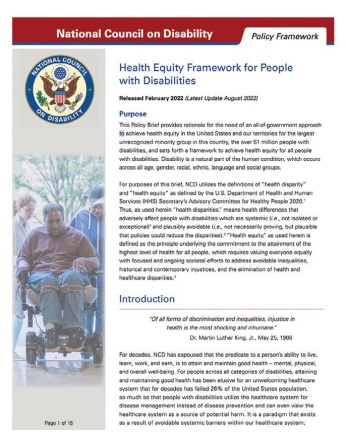NEW REPORTS TO HELP YOU ADVOCATE FOR HEALTH EQUITY FOR PEOPLE WITH DISABILITIES
BY CRAIG ESCUDE, MD, FAAFP, FAADM
In the last year, we have seen three significant announcements relating to improving healthcare for people with disabilities, including those with intellectual and developmental disabilities (IDD).
In this article, I’ll summarize all three. That’s my part. Your part as advocates for people with IDD is to use this information to inform legislators, physician groups, hospitals, insurance plans, managed care organizations, medical schools, nursing schools, dental schools, medical licensure boards,
and other healthcare entities to TAKE ACTION to incorporate training and education for students, optimize physical environments to make them more accessible, and to build a healthcare system where people with IDD can receive equitable healthcare.
SOURCE 1 : THE NATIONAL COUNCIL ON DISBILITY

The Release of the National Council on Disability's Framework for Health Equity for People with Disabilities
February 2022
ncd.gov/sites/default/files/NCD_Health_Equity_Framework.pdf
The NCD's framework "provides a roadmap for fixing systemic barriers within our healthcare system and references many examples of the well-documented health disparities and inequities that demand action for over 61 million people with disabilities." The framework calls for five significant changes
and thirty-eight other recommended changes to foster health equity for all. The five core components include:
- designating people with disabilities as a Special Medically Underserved Population (SMUP) under the Public Health Services Act
- designating people with disabilities as a Health Disparity Population under the Minority Health and Health Disparities Research and Education Act
- requiring comprehensive disability clinical-care curricula in all US medical, nursing, and other healthcare professional schools and requiring disability competency education and training of medical, nursing, and other healthcare professionals
- requiring the use of accessible medical and diagnostic equipment
- improving data collection concerning healthcare for people with disabilities across the lifespan The additional thirty-eight items cover a wide range of recommendations, including making medical offices "sensory-friendly," creating an "essential disability benefits" list of home and community-based services, mandating Medicare coverage for many services specifically beneficial to people with disabilities, including dental coverage, and mandating that health plans include a person with a disability in the peer review process for claims, among others.